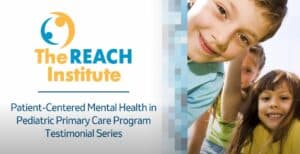What if the child’s caregiver has mental health issues too?
- May 13, 2019
- The REACH Institute
- Parents Pediatric primary care,

“Mental health flows in both directions, not just downhill from parent to child,” said Peter S. Jensen, MD, founder and board chair of The REACH Institute. The effects on children when caregivers suffer from mental health problems are well documented. Another pattern is that parents and children can share an inherited tendency toward the same disorder. Furthermore, a child’s struggles can trigger disorders such as depression or anxiety in a caregiver.
“Blaming parents for their children’s mental health issues is not only a tactical mistake,” said Dr. Jensen, “it’s also simply incorrect.”
Pediatric practitioners have to tread carefully when they suspect that the caregiver of a child they are treating has mental health issues. Family practitioners have the advantage of being able to treat the adult as well as the child. Still, Molly Scharf, MD, another REACH faculty member and a family physician in Lima, NY, agrees that any hint of blame in approaching caregiver mental health is counterproductive.
Instead, both REACH faculty members recommend approaching caregivers with compassion and empathy. Dr. Scharf recommends a humble, curious approach that avoids condemnation. Dr. Jensen said that he likes to ask how the child’s condition is affecting the caregiver: “Wow, it must really be hard to see your child struggling like this. How are you coping?”
Another way to help parents open up is to ask whether they can relate to what their child is going through. Particularly in cases of ADHD, the parent often struggled as a child with the same issues. Seeing how the child is being helped by treatment can encourage caregivers to get help themselves.
Once some trust has been established, the practitioner may give the caregiver a self-assessment tool (see Resources) to continue the dialogue. Dr. Jensen reiterated that the approach to the caregiver’s responses has to be compassionate and nondirective: “Your answers suggest that you really are struggling. How can we get you some support?”
Once caregivers can talk about their issues, the next step is to help them into treatment. Both Dr. Jensen and Dr. Scharf suggest appealing to parents’ desire to care for their children. “Parents say, ‘I don’t care about me, just help my child,'” said Dr. Jensen. “I tell them that what will help their child is to be in a happy and healthy family.” He continues to emphasize how the child’s struggles affect the caregiver. “I say, ‘Your parenting skills are probably fine for most kids. But for this kid, you need extra support. You need a Black Belt in parenting.”
Dr. Scharf told a story of a mother who was struggling with treatment for addiction. What worked was to ask her, “Doesn’t your son deserve a mother who feels good about herself?”
When caregivers seem open to treatment, Dr. Scharf pointed out, family practitioners can simply say, “Suppose we set up a separate appointment for you, too?” Practitioners who have taken the REACH course Adult Behavioral Health in Primary Care are in a strong position to treat caregivers’ mental health issues rather than referring to specialists.
For pediatric providers, getting help for caregivers means referring them to an appropriate provider. Dr. Jensen emphasized the importance of building a network of local referrals. He gathers recommendations particularly from his patients’ parents, but also from other providers and from local chapters of national mental health organizations (see Resources).
From the initial approach through to referral or treatment, compassion — rather than judgment — is what makes it possible to help struggling caregivers. As Dr. Jensen put it, “This is the hidden gem that undergirds successful work with families: loving them — and letting it show.”
Resources
Screening tools
Dr. Scharf and Dr. Jensen agree that self-assessments can help caregivers see their need for mental health care. Freely available rating scales include the following:
“Even if you’re not going to treat the parent,” said Dr. Jensen, “you can use the results of this tool to have a warm conversation.”
Mental health organizations
Dr. Jensen recommends contacting local chapters of national mental health associations for referrals to mental health specialists. “Call the local chapter head and ask, ‘Who are families talking about?'”
- NAMI, National Alliance on Mental Illness
- CHADS Coalition, Communities Healing Adolescent Depression and Suicide
- DBSA, Depression and Bipolar Support Alliance
- ADAA, Anxiety and Depression Association of America
Another way Dr. Jensen uses these organizations is for family support. “I show them the website and tell them that their homework is to go to the next chapter meeting. It’s important for families to get support from other families who are going through the same thing.”
Categories
- ADHD
- Anti-racism
- Anxiety
- Assessment & screening
- Autism
- Child mental health
- Coding
- Cognitive behavioral therapy
- College transition
- Culturally responsive
- Depression
- Eating disorders
- Foster care
- Grief
- High-risk children & youth
- LGBTQIA
- Medication
- Parents
- Patient communication
- Pediatric primary care
- School refusal
- Sleep disorders
- Suicide
- Trauma
- Show All Categories
Register for courses
“The REACH Institute Video Testimonials: JoAnn  ”
”
